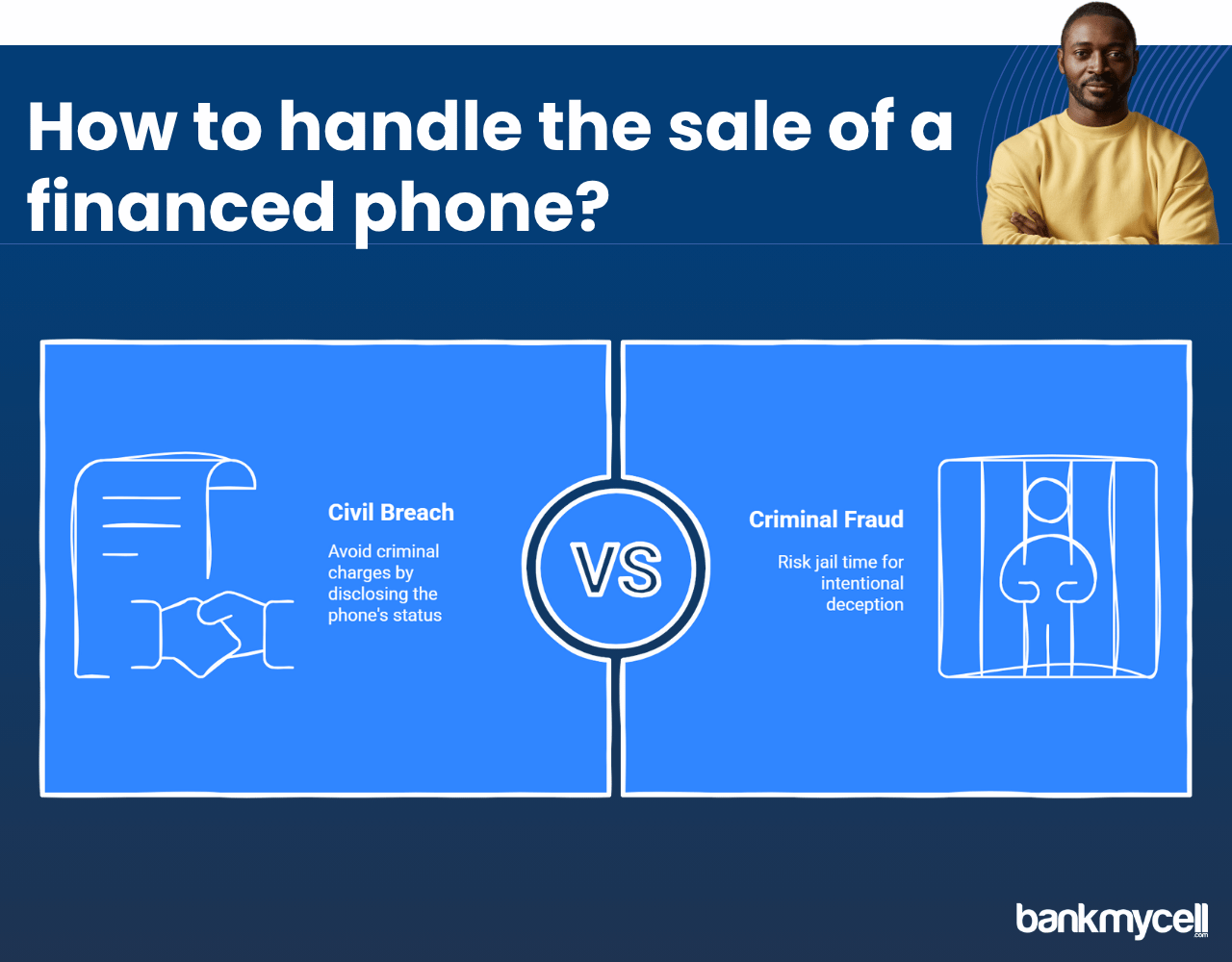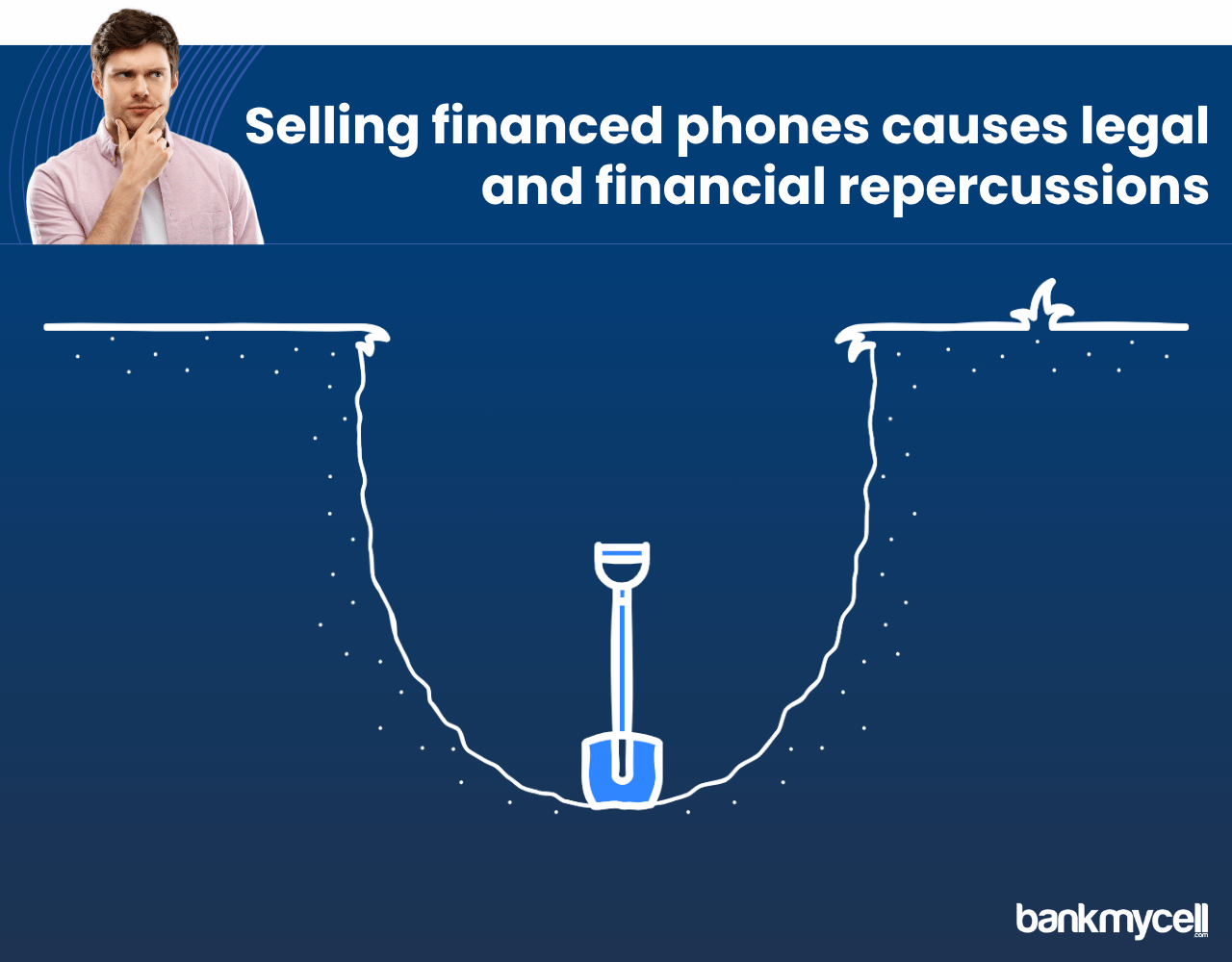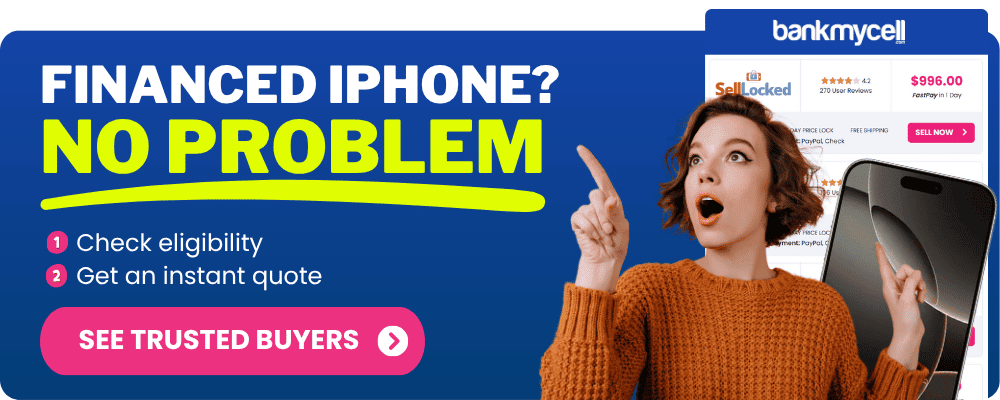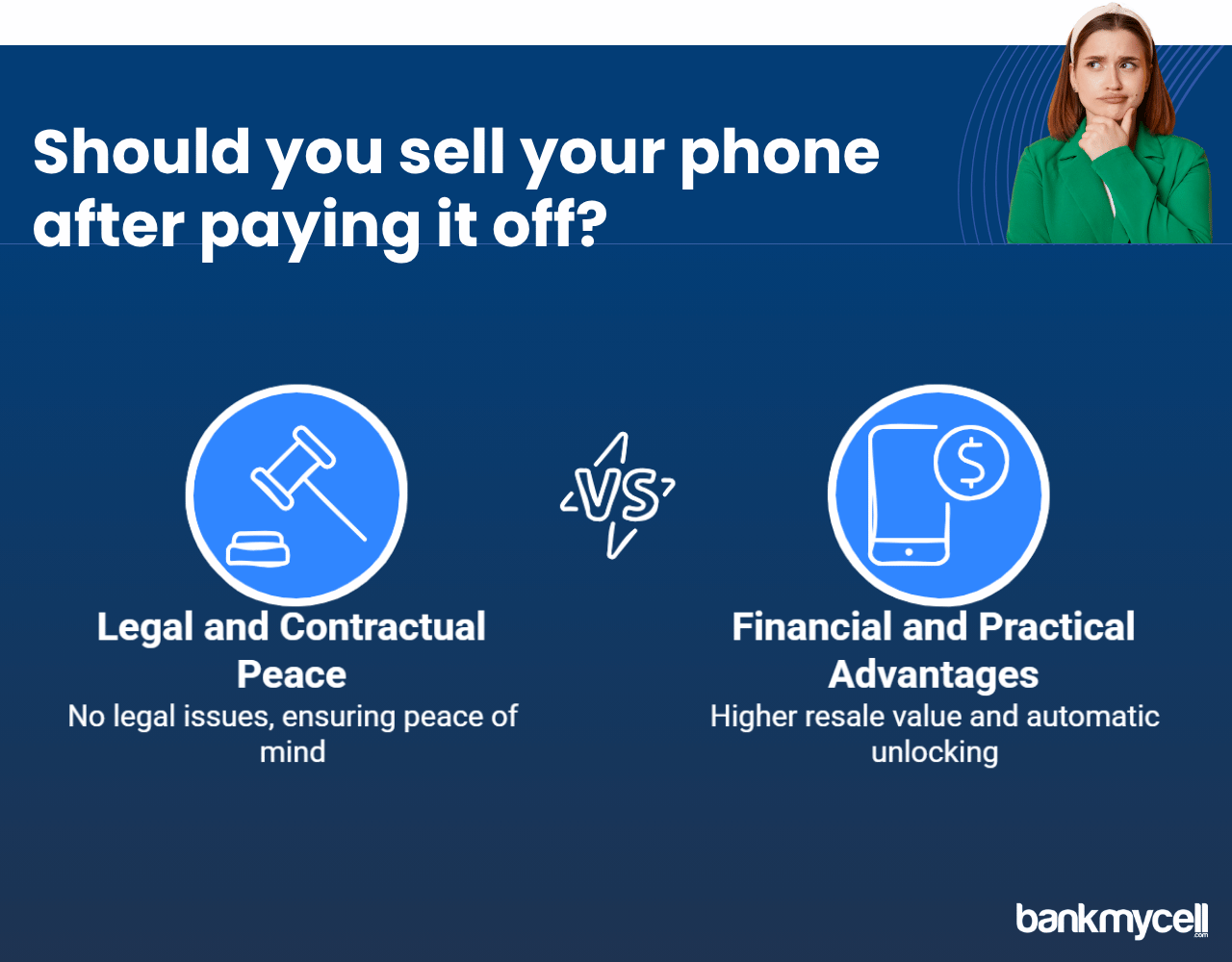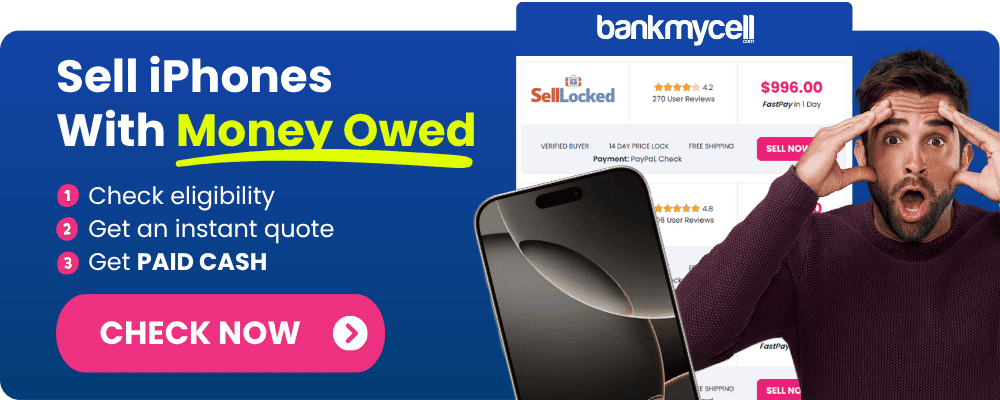Is It Illegal to Sell a Phone That Isn't Paid Off? Legal Issues When Selling Financed iPhones
60-Second Summary
Selling a Financed iPhone? Here’s Everything You Need to Know
Selling a financed iPhone is not illegal, but it generally goes against your carrier contract and presents serious risks to both the seller and the buyer.
Legal Status
- Not a crime – Selling a financed phone is a civil contract matter and not a criminal one.
- Carrier contract breach – Carriers usually ban selling a phone before it’s fully paid off.
- Fraud potential – Willful non-disclosure of financing status or intent not to pay off can become a crime.
- Read more about legal details
Main Risks
Seller:
- Full payment liability after selling a financed phone
- Blacklist from the carrier if you stop payments making the device unusable
- Credit score impact from missed payments or collections
- Possible lawsuits for the remaining balance
Buyer:
- Financed device will become a useless “paperweight” if seller stops payments
- No actual ownership rights despite paying fair market price
- Limited legal options against sellers if problems occur
- Learn more about risks for both parties
Legal Solutions
- Paying off the device first – Best option that avoids all legal complications
- Carrier trade-in programs – Contractually correct but low payout
- Transfer of liability – Possible with some carriers, subject to good credit
- Full disclosure sales – High-risk gray area with specific written disclosure
- Discover other legal options
Carrier Policies
- Verizon, AT&T, T-Mobile, Sprint – all carriers officially prohibit selling financed phones
- Enforcement is inconsistent – Carriers mostly do not actively track device usage
- Issues arise only when payments are stopped, then device is blacklisted
- Read about each carrier’s policy
Selling a Financed iPhone With Balance
- Full written disclosure to the buyer in the form of a bill of sale
- Payments must continue by the seller until fully paid off – auto-pay recommended
- Contact info provided to the buyer, seller should be readily available
- High-value transactions consider using escrow service for added security
- Best practices in disclosure and sale process
The Bottom Line: The easiest legal path is to always pay off your phone before selling it. If you can’t do that, then use carrier trade-in or upgrade programs or consider selling through BankMyCell if instant cash is more valuable to you than a phone you can’t afford.
Can’t afford to settle the balance on your financed phone? BankMyCell works with reliable sellers even if the device is still being paid off while strictly ensuring disclosure about this and payment obligations. Earn competitive BankMyCell trade-in values from vetted shops with free shipping for your financed phone and legally sell it to get immediate money value for a device you can’t afford—turning your financial loss into at least an instant cash benefit.
Disclaimer: You can sell financed iPhones, but you are still responsible for the finance payments. The sale does not end your responsibility to continue your contract payments. Always check your carrier’s terms if you are not clear.
| TODAY'S BEST iPHONE BUYBACK OFFERS | |||
|---|---|---|---|
| Device | Financed | ||
| iPhone 17 Pro Max | $1460.00 | Compare | |
| iPhone 17 Pro | $1070.00 | Compare | |
| iPhone 17 | $680.00 | Compare | |
| iPhone Air | $640.00 | Compare | |
| iPhone 16e | $410.00 | Compare | |
| iPhone 16 Pro Max | $1095.00 | Compare | |
| iPhone 16 Pro | $920.00 | Compare | |
| iPhone 16 Plus | $610.00 | Compare | |
| iPhone 16 | $475.00 | Compare | |
| iPhone 15 Pro Max | $780.00 | Compare | |
| iPhone 15 Pro | $700.00 | Compare | |
| iPhone 15 Plus | $385.00 | Compare | |
| iPhone 15 | $395.00 | Compare | |
| iPhone 14 Pro Max | $620.00 | Compare | |
| iPhone 14 Pro | $450.00 | Compare | |
| iPhone 14 Plus | $315.00 | Compare | |
| iPhone 14 | $285.00 | Compare | |
| iPhone 13 Pro Max | $330.00 | Compare | |
| iPhone 13 Pro | $270.00 | Compare | |
| iPhone 13 Mini | $155.00 | Compare | |
| iPhone 13 | $165.00 | Compare | |
| iPhone 12 Pro Max | $220.00 | Compare | |
| iPhone 12 Pro | $160.00 | Compare | |
| iPhone 12 Mini | $135.00 | Compare | |
| iPhone 12 | $135.00 | Compare | |
| iPhone 11 Pro Max | $175.00 | Compare | |
| iPhone 11 Pro | $195.00 | Compare | |
| iPhone 11 | $130.00 | Compare | |
| * Best market prices updated February 19th 2026 | |||

Data Source: BankMyCell compares over 100,000+ quotes and customer reviews from 20+ trusted buyback stores every 15 minutes via our data feeds, making us America’s #1 time-saving trade-in supermarket.
Do you risk legal consequences by selling your iPhone, which you are still paying off in monthly installments?
Numerous iPhone owners face scenarios where they must sell their device before they have finished paying off their balance. You might want to upgrade your phone early because you need money fast or you just want to get a new phone model. But there’s always that nagging question: What legal issues arise when selling a phone that still has an outstanding balance from your financing contract?
Here’s the problem:
Selling a device you’ve acquired through financing results in the physical transfer of an item which remains partially owned by the lender until complete payment. Selling a financed phone generates a complicated legal situation with your service provider which may result in significant penalties including early termination fees.
And that’s not all…
Specific ownership and transfer rights language exists in most carrier contracts and financing agreements but many people overlook these terms when they agree to their payment plans.
Understanding the Legal Status
Can you face legal issues when selling a phone that you have not fully paid for yet? Understanding the Legal Status
Let’s start by addressing the central question: The legality of selling a phone that you’re still making payments on depends on various factors outlined in your financing contract with your service provider.
The legality of selling a phone with remaining payments doesn’t result in a simple yes or no answer because it depends on multiple conditions found in your financing agreement with your service provider.
These points will guide you through the process of selling a phone that you are still paying off.
The act of selling an iPhone which is still under financing terms doesn’t automatically lead to criminal charges. The act of selling a financed phone typically won’t result in criminal charges or an arrest. However, there are important distinctions to make:
- When you sell a financed phone it typically breaches your agreement with the financing entity but such contract breaches are categorized as civil issues instead of criminal offenses.
- The act of selling a phone while planning not to pay future balances constitutes fraud which moves the transaction into possible criminal territory.
- Failing to disclose the phone’s financed status and outstanding balance to the buyer could result in charges of fraudulent misrepresentation.
Your Phone Contract and Ownership Rights
By signing the iPhone financing agreement you accept particular ownership and transfer rights as set by your service provider.
Typically, these phone contracts state that:
- Ownership rights over the device remain incomplete until all monthly payments have been settled.
- The carrier holds a financial security interest in your device
- You must obtain permission before selling, transferring or giving away the device.
- The remaining balance remains your financial responsibility no matter who holds physical possession of the phone.
The extent to which carriers enforce their phone contract terms differs widely between providers but many individuals successfully sell financed phones without facing immediate repercussions.
Want to upgrade without legal concerns? The website BankMyCell helps you compare buyback values enabling you to pay off your phone and sell it legally while maintaining complete peace of mind.
When you sell a phone with outstanding monthly payments you own, both you and the buyer face potential repercussions.
What are the potential consequences when you sell an iPhone financed through monthly payments before the balance is cleared? Both the seller and the buyer who receives a phone with an unpaid balance will face the consequences.
For Sellers of Financed Phones
Contract breach consequences:
- Your liability continues for both the remaining balance and monthly payments after selling the phone.
- Stopping payments will damage your credit report.
- Network providers might blacklist the phone’s electronic serial number which would prevent the device from working on their systems.
- You may face a civil lawsuit regarding the unpaid balance of your payment plan.
- Selling financed phones could lead to criminal charges in instances of severe fraud.
For Buyers of Contract Phones
Purchasing a financed iPhone exposes buyers to substantial risks
- The device will become blocked from cellular networks if the seller fails to continue payments.
- Payment for the device at a reasonable price won’t grant buyers any legal ownership rights.
- Customers may face activation problems on some networks when using the device.
- Buyers often have limited options for recourse against sellers in these situations.
- A phone with a bad IMEI or bad ESN could become an expensive paperweight for buyers.
Sellers of financed phones need proper disclosure to buyers because it serves as both an ethical standard and necessary legal protection.
Disclaimer: You can sell financed iPhones, but you are still responsible for the finance payments. The sale does not end your responsibility to continue your contract payments. Always check your carrier’s terms if you are not clear.
How Different Carriers Handle Selling Financed Phones
The policies and enforcement approaches for selling financed devices differ among each major carrier when money is still owed on them.
Verizon Phone Policies
Your Verizon device payment agreement requires that you refrain from selling the device until the total balance is paid off. Verizon typically unlocks phones after 60 days which allows new owners to use them.
When you default on payments for a Verizon phone financed through a payment plan:
- The account will go into collections
- Extended periods of non-payment may result in the device being blacklisted.
- Making payments on time is crucial because your credit rating will probably decrease if you default.
AT&T Policies
The terms of AT&T’s installment plans prevent customers from selling or transferring their devices before completing full payment. AT&T maintains network restrictions on devices until their installment payments are completely settled.
AT&T consequences include:
- Immediate blacklisting possibility if transfers are detected
- Acceleration of the remaining balance due
- Potential immediate service interruption
T-Mobile Phone Restrictions
The EIP agreement from T-Mobile imposes similar prohibitions against selling devices before full payment completion.
T-Mobile’s enforcement includes:
- Your T-Mobile phone gets blacklisted when you fail to make scheduled payments.
- Potential account suspension
- Full balance becomes immediately due
Sprint Policies
After Sprint became part of T-Mobile its policies now mostly match T-Mobile’s but some old Sprint plans might have different rules.
Common Sprint consequences include:
- Device blacklisting if you stop making payments
- Reporting to credit agencies
- Acceleration of the remaining balance
Multiple legal methods exist to sell your phone which you’re still financing through a carrier.
You can find multiple legal solutions to sell a financed iPhone before your contract ends despite existing restrictions.
Legal Alternatives to Selling Your Financed Phone
Pay Off the Device First
The best method to sell your financed device without penalties is to pay it off completely before you sell it.
This approach offers several advantages:
- You won’t face any legal or contractual issues with your service provider when you sell the device.
- Users usually find their phones automatically unlocked from the carrier once they finish paying off their device.
- An unlocked phone maintains a higher resale value when you decide to sell it.
- Both seller and buyer experience peace of mind through this approach.
Carrier Trade-In Programs
Many carriers provide trade-in programs enabling customers to transition to newer models by trading in their existing devices despite having unsettled balances.
Benefits of official trade-in programs:
- Contractually sanctioned by your carrier
- No risk of contract violation
- Many official trade-in programs come with promotional credits for buying a new phone.
- Completely legal and above board
When you trade in your leased phone through the carrier you lose out on more value than you would in a private sale.
Transfer of Liability (Where Available)
Certain carriers offer the option to transfer liability which allows another person to assume ownership of the device as well as take responsibility for the outstanding payments.
This process typically requires:
- Both parties to have good credit standing
- Completion of carrier-specific paperwork
- Approval from the service provider directly
- Sometimes a transfer fee
While some carriers accept phones for transfer of liability others maintain tight restrictions when they do accept phones for this service.
Need to understand your specific carrier’s policies? BankMyCell guides buyers through suitable sales methods for their particular carrier and financing circumstances.
Selling With Full Disclosure: The Gray Area
Full disclosure to potential buyers becomes critical when selling your financed iPhone during payment to prevent legal problems
Proper disclosure should include:
1. Get Everything in Writing
Create a bill of sale that clearly states:
- The phone is being financed with payments still due each month
- You agree to continue making payments until the phone is paid off
- The purchaser acknowledges and accepts this fact
- Contact information for all parties
Have both parties sign the document and keep a copy when selling your phone.
2. Keep a perfect payment record
Put automatic payments in place so you can never miss a payment on the device again. Paying a few months ahead of time when possible is also recommended so you don’t run into problems down the road after the sale.
3. Provide Your Contact Information
Provide your actual contact information to the purchaser and remain available for communication in the event issues arise with the mobile phone.
4. Consider Escrow for Larger Transactions
For expensive iPhones, an escrow service can provide additional protection for both parties when selling financed phones.
Disclaimer: You can sell financed iPhones, but you are still responsible for the finance payments. The sale does not end your responsibility to continue your contract payments. Always check your carrier’s terms if you are not clear.
Frequently Asked Questions About Selling Phones That Aren't Paid Off
Can a carrier track if I sell my financed iPhone?
Carriers typically don’t actively track the physical possession of your device. However, they may notice if the device suddenly begins using a different SIM card or appears on another account with a different carrier. The main issue arises if payments stop being made on the financed device.
What happens if I sell my financed iPhone and then miss a payment?
If you miss payments after selling your financed iPhone, the carrier will likely blacklist the device’s IMEI number, making it unusable on cellular networks. This affects the buyer, who may then pursue legal action against you for selling them a device that became unusable due to a bad ESN.
Can I transfer my phone financing to the buyer?
Some carriers offer transfer of liability programs that allow another person to take over both the device and the payment plan, but this requires carrier approval and the buyer must meet credit requirements. Not all carriers offer this option, and the process varies significantly between those that do.
Will selling a financed phone affect my credit score?
Simply selling the phone won’t affect your credit score as long as you continue making all required monthly payments. However, if you stop making payments because you no longer have the phone, the missed payments and potential collections actions will negatively impact your credit report.
Is it different if I'm on a lease rather than a financing agreement?
Yes, leased phones typically have even stricter limitations on transfers than financed phones. With a lease, you never own the device at any point until you exercise a purchase option, making selling a leased phone potentially more problematic legally than selling a financed one with monthly installments.
Wrapping It Up
Selling a financed iPhone exists in a legal gray area – it’s generally not illegal in the criminal sense, but it typically violates your contract terms with your carrier or financing company.
By following the methods outlined in this guide, you can:
- Understand the legal risks involved in selling a financed iPhone you still owe money on
- Make informed decisions about how to proceed with selling your phone
- Protect yourself from more serious legal consequences
- Consider alternatives that keep you in the clear legally when switching carriers
As always, the best and safest option is to pay your device off before selling it. If that is not an option, be up front with potential buyers about the financing, keep making your payments, and take advantage of any carrier approved transfer programs available to you.

